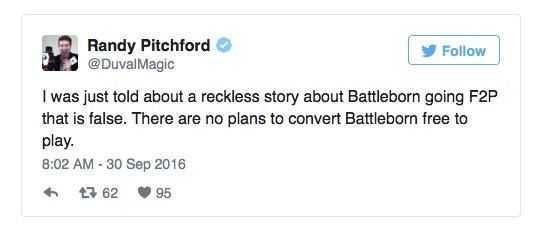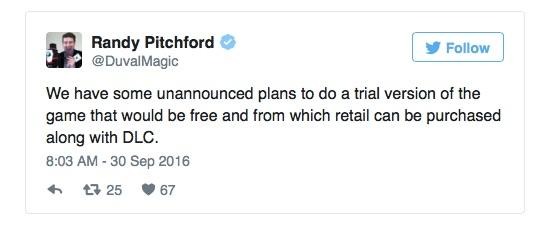Battleborn to go partially free-to-play in the near future
Battleborn, the recently released first-person hero shooter from the developers of Borderlands, mostly scored well among critics, but has been little more than a flop among gamers (thanks in part, no doubt, to the release of Blizzard's Overwatch). However, developer Gearbox is committed to continuing support for the game, and it appears that a shake-up in how it's sold is part of their plans. In other words, Battleborn will be going free-to-play in a manner, with extra content and options requiring purchase.Kotaku was the first to report on the change coming to Battleborn at some point soon, but with the expectation that it would use the standard F2P model that we're used to; i.e. the game is, well, free to play, with additional things like items, bonuses, and levels offered as paid extras.
This report caught the eye of Gearbox head Randy Pitchford, who apparently wasn't too happy of the news, as he tweeted that there's "no plans to convert Battleborn [to] free to play." He then immediately followed with another tweet confirming that a free trial is on the way. However, what Pitchford describes differs very little from what most of us would call "free to play."


Additional details were then revealed detailing that this free trail won't be time-limited, and that it will allow players to play the game and optionally pay for extra content. Basically the free trail will consist of Battleborn's multiplayer modes and a choice of a select few of the game's long list of characters. The available characters will be on a timed rotation, and players have the option buying access to the full line-up, single-player/co-op story missions, and upcoming DLC.
The change in price model shouldn't come as a huge surprise to those who've been following Battleborn since release. It was well reviewed but hasn't sold well at all, and has been featured in sales and received drastic price cuts shortly after launch.
While Battleborn and Overwatch have a number of differences (not to mention a full story campaign featured in the former), the fact that they're in the same genre, have a similar form of gameplay, and were released within a month of each other means it was easy for the general public to get them mixed up, or simply not know about one altogether.
